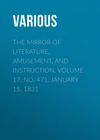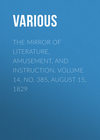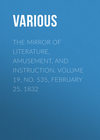Loe raamatut: «Blackwood's Edinburgh Magazine, Vol. 66, No 405, July 1849», lehekülg 10
DOMINIQUE
A SKETCH FROM LIFE
TWO STUDENTS
At the lower extremity of that ancient street long recognised as the head and centre of the Pays Latin or scholastic quarter of Paris, and which, for six centuries, has borne the name of the Rue de la Harpe, within a few doors of the bridge of St Michel, and in a room upon the fifth floor, two young men were seated, on a spring morning of the year 182-. Even had the modest apartment been situated elsewhere than in the focus of the students' district, its appearance would have prevented the possibility of mistake as to the character of its inmates. Scanty furniture, considerably battered, caricatures of student life, partially veiling the dirty damp-stained paper that blistered upon the walls, which were also adorned by a pair of foils, a cracked guitar, and a set of castanets; a row of pegs supporting pipes, empty bottles in one corner, ponderous octavos thickly coated with dust in another, told a tale confirmed by the exterior of the occupants of the apartment. One of these, a young man of two-and-twenty, was evidently at home, for his feet were thrust into slippers, once embroidered, a Greek cap covered his head, and a tattered dressing-gown of pristine magnificence enveloped his slender and active figure. His features were regular and intelligent, and he had the dark fiery eyes, clustering black hair, and precociously abundant beard of a native of southern France. His companion, a young Norman, had nothing particularly noticeable in his countenance, save a broad open brow and a character of much shrewdness and perspicacity – qualities possessed in a high degree by a majority of his fellow provincials. His dress was one of those nondescript eccentric coats and conical broad-leafed hats at all times particularly affected by French studiosi.
The two young men were seated at either extremity of the low sill of a tall French window, thrown wide open to admit the pleasant spring sunshine, into which they puffed, from capacious pipes, wreaths of thin blue smoke. Their conversation turned upon a crime – or rather a series of crimes – which occasioned, at that particular moment, much excitement in Paris, and which will still be remembered by those persons upon the tablets of whose memory the lapse of a quarter of a century does not act as a spunge. About three years previously, a young man named Gilbert Gaudry, of respectable family, liberal education, and good reputation, had been tried and convicted for the murder of an uncle, by whose death he largely inherited. The accused man was in debt, and his embarrassed circumstances prevented his marrying a woman to whom he was passionately attached; his uncle had recently refused him pecuniary assistance, upon which occasion Gaudry was heard to express himself harshly and angrily. Many other circumstances concurred to throw upon him the odium of the crime; and, altogether, the evidence, although entirely circumstantial, was so strong against him, that, in spite of his powerful appeal and solemn denial, the judge condemned him to death. The sentence had been commuted to the galleys for life. Three years passed, and the real murderer was discovered – a discharged servant of the murdered man, who, at the trial, had given important evidence against Gaudry. The guillotine did its work on the right offender, and Gaudry's sentence was reversed. But three years of slavery and opprobrium, of shame, horror, and gnawing sense of injustice, had wrought terribly upon the misjudged man, inspiring him with a blind and burning thirst of revenge. Almost his first act, on finding himself at liberty, was to stab, in broad daylight, and in the open street, the judge who had condemned him. This time there could be no question of his guilt, and he would inevitably have been condemned to death; but, before his trial, he found means of hanging himself in his cell. This last tragical and shocking incident had occurred but two days previously, and now furnished the embryo jurists with a theme for animated discussion. Without vindicating the wretched murderer and suicide, the young Norman was disposed to find an extenuating circumstance in the unjust punishment he had endured. But his friend scouted such leniency, and, taking up high ground, maintained that no criminal was baser than he who, the victim of judicial error, revenged himself upon the magistrate who had decided according to the best of his judgment and conscience, but who, sharing the liability to err of every human judge, was misled by deceitful appearances or perjured witnesses.
"Argue it as you will," cried Dominique Lafon; "be plausible and eloquent, bring batteries of sophisms to the attack, you cannot breach my solid position. Excuse and extenuation are alike in vain. I repeat and maintain, that to make a magistrate personally responsible for his judgments, be they just or unjust, so long as he has kept within the line of his duty, and acted according to his conscience, is revenge of the basest and most criminal description."
"Bear in mind," replied Henry la Chapelle, "that I attempt not to justify the unhappy Gaudry. All I assert is, that injustice excites in the breast of every man, even of the gentlest, hatred against him by whom the injustice is done. And its frequent repetition, or the long continuance of the suffering it occasions, will ultimately provoke, in nine cases out of ten, an outbreak of revengeful fury. The heart becomes embittered, the judgment blinded, the mild and beautiful injunctions of Scripture are forgotten or disregarded, in the gust of passion and vindictive rage. To offer the left cheek when the right has been buffeted, is, of all divine precepts, the most difficult to follow. A man ruined, tortured, or disgraced by injustice, looks to the sentence, not to the intention, of his judge; taxes him with precipitation, prejudice, or over-severity, and views revenge as a right rather than a crime. Doubtless there are exceptions – men whose Christian endurance would abide by them even unto death; but, believe me, they are few, very few. The virtues of Job are rare; and rancour, the vile weed, chokes, in our corrupt age, the meek flower, resignation."
"A man to whom injustice is really done," said Dominique, "may console himself with the consciousness of his innocence, which an act of rancorous revenge would induce many to doubt. The suffering victim finds sympathy; the fierce avenger excites horror and reprobation."
"Mere words, my dear fellow," replied la Chapelle. "Fine phrases, and nothing else. You are a theorist, pleading against human nature. What logic is this? Undeserved punishment is far more difficult to endure than merited castigation; and an act of revenge should rather plead in favour of the innocence of him who commits it. In a criminal, the consciousness that he merited his punishment would leave less room for hatred than for shame; it would excite vexation at his ill luck, rather than enduring anger against his judge. There would be exceptions and variations, of course, according to the moral idiosyncracy of the individual. It is impossible to establish a mathematical scale for the workings of human passions. I repeat that I do not justify such revenge, but I still maintain that to seek it is natural to man, and that many men, even with less aggravation than was given to Gaudry, might not have sufficient resolution and virtue to resist the impulse."
"You have but a paltry opinion of your fellow-creatures," said Dominique. "I am glad to think better of them. And I hold him a weak slave to the corruption of our nature, who has not strength to repress the impulse to a deed his conscience cannot justify."
"Admirable in principle," said la Chapelle, smiling, "but difficult in practice. You yourself, my dear Dominique, who now take so lofty a tone, and who feel, I am quite sure, exactly as you speak – you yourself, if I am not greatly mistaken in your character, would be the last man to sit down quietly under injustice. Your natural ardour and impetuosity would soon upset your moral code."
"Never!" vehemently exclaimed Dominique. "La Chapelle, never will I suffer my passions thus to subdue my reason! What gratification of revenge can ever compensate the loss of that greatest of blessings, a pure and tranquil conscience? What peace of mind could I hope for, after permitting such discord between my principles and my actions? La Chapelle, you wrong me by the thought."
"Well, well," replied his friend, "I may be wrong, and at any rate I reason in the abstract rather than personally to you. I heartily wish you never may suffer wrong, or be tempted to revenge. But remember, my friend, safety is not in over-confidence. The severest assaults are for the strongest towers."
A knock at the room-door interrupted the conversation. It was the porter of the lodging-house, bringing a letter that had just arrived for Dominique. On recognising the handwriting of the address, and the postmark of Montauban, the young man uttered a cry of pleasure. It was from home, from his mother. He hastily tore it open. But as he read, the smile of joy and gratified affection faded from his features, and was replaced by an expression of astonishment, indignation, grief. Scarcely finishing the letter, he crumpled it in his hand with a passionate gesture, and stripping off his dressing-gown began hastily to dress. With friendly solicitude la Chapelle observed his varying countenance.
"No bad news, I hope?" he inquired.
For sole reply, Dominique threw him the letter.
MOTHER AND SON
Dominique Lafon was the son of a man noted for his democratic principles, who, after holding high provincial office under the Republic and the Consulate, resigned his functions in displeasure, when Napoleon grasped an emperor's sceptre, and retired to his native town of Montauban, where he since had lived upon a modest patrimony. Under Napoleon, Pascal Lafon had been unmolested; but when the Bourbons returned, his name, prominent during the last years of the eighteenth century, rendered him the object of a certain surveillance on the part of the police of the Restoration. On the occasion of more than one republican conspiracy, real or imaginary, spies had been set upon him, and endeavours made to prove him implicated. Once he had even been conducted before a tribunal, and had undergone a short examination. Nothing, however, had been elicited that in any way compromised him; and in a few hours he was again at liberty, before his family knew of his brief arrest. In reality, Lafon, although still an ardent republican, was entirely guiltless of plotting against the monarchy, which he deemed too firmly consolidated to be as yet shaken. France, he felt, had need of repose before again entering the revolutionary arena. His firm faith still was, that a time would come when she would dismiss her kings for ever, and when pure democracy would govern the land. But before that time arrived, his eyes, he believed, would be closed in death. He was no conspirator, but he did not shun the society of those who were; and, moreover, he was not sufficiently guarded in the expression of his republican opinions and Utopian theories. Hence it came that, like the Whig in Claverhouse's memoranda, he had a triple red cross against his name in the note-book of the Bourbon police, who, at the time now referred to, had been put upon the alert by the recent assassination of the Duke of Berri. Although the circumstances of that crime, and the evidence upon Louvel's trial, combined to stamp the atrocious deed as the unaided act of a fanatic, without accomplices or ulterior designs, the event had provoked much rigid investigation of the schemes of political malcontents throughout France; and in several districts and towns, magistrates and heads of police had been replaced, as lax and lukewarm, by men of sterner character. Amongst other changes, the Judge of Instruction at Montauban had had a successor given him. The new magistrate was preceded by a reputation of great vigilance and severity – a reputation he lost no time in justifying. By the aid of a couple of keen Parisian police agents of the Procureur du Roi, whom he stimulated to increased activity, he soon got upon the scent of a republican conspiracy, of which Montauban was said to be a principal focus. Various reports were abroad as to the manner in which Monsieur Noell, the new judge, had obtained his information. Some said, the plotters had been betrayed by the mistress of one of them, in a fit of jealous fury at a fancied infidelity of her lover; others declared, that hope of reward had quickened the invention of a police spy, who, despairing of discovering a conspiracy, had applied himself to fabricate one. Be that as it might, a number of arrests took place, and, amongst others, that of Dominique's father. The intelligence of this event was conveyed to the young student in a few despairing lines from his mother, whose health, already very precarious, had suddenly given way under the shock of her husband's imprisonment. She wrote from a sick-bed, imploring her son to lose no time in returning to Montauban.
Gloomy were the forebodings of Dominique as the mail rattled him over the weary leagues of road between Paris and Montauban. Yet, when he reached home, he half hoped to be greeted by his father's friendly voice, for, himself convinced of his innocence, he could not believe the authorities would be long in recognising it. He was disappointed. The sorrowful mien of the domestic who opened the door told a tale of misfortune.
"Oh, Monsieur Dominique!" said the man, an old servant, who had known the student from his cradle, "the house is not wont to be so sad when you return."
"My mother! where is my mother?" cried Dominique. The next instant he was at her bedside, clasping her poor thin fingers, and gazing in agony on her emaciated features. A few days of intense alarm and anxiety, acting on an exquisitely susceptible organisation, had done the work of months of malady. A slow fever was in her veins, undermining her existence. Dominique shuddered at sight of her sunken temples, and of the deep dark furrows below her eyes. It seemed as if the angel of death had already put his stamp upon that beloved countenance. But he concealed his mental anguish, and spoke cheeringly to the invalid. She told him the particulars of his father's arrest. She had already written to some friends, sent for others, and had done all in her power to ascertain exactly the offences of which Lafon was accused; but the persons who had made the inquiries had been put off with generalities, and none had obtained access to the prisoner, who was in solitary confinement.
Dominique Lafon was tenderly attached to both his parents. Upon him, their only child, their entire affection was concentrated and lavished. They had made him their companion even from his earliest years, had tended him with unwearying solicitude through his delicate infancy, had devoted themselves to his education when he grew older, and had consented with difficulty and regret to part from him, when his arrival at man's estate rendered it desirable he should visit the capital for the conclusion of his studies. Dominique repaid their care with devoted love. His father's consistency and strength of character inspired him with respect; he listened to his precepts with veneration and gratitude; but he idolised his mother, whose feminine graces and tender care were intertwined with the sweetest reminiscences of childhood's happy days. He now strove to repay some portion of his debt of filial love by the most unwearying attendance at the invalid's pillow. His arrival brought a gleam of joy and hope to the sick woman's brow, but the ray was transient, and quickly faded. The vital flame had sunk too low to revive again permanently. She grew weaker and weaker, and felt that her hour approached. But her spirit, so soon to appear before her Maker, yet clung to an earthly love. Whilst striving to fix her thoughts on things heavenly, they still dwelt upon him by whose side she had made life's checkered pilgrimage. She wrung her hands in agony at the thought that she must leave the world without bidding him a last farewell. She asked but a moment to embrace him who, for five-and-twenty years, had been her guardian and protector, her tenderest friend and companion. Dominique could not endure the spectacle of her grief. He left the house to use every endeavour to obtain for her the indulgence she so ardently desired.
The first person to whom he applied was the Judge of Instruction, Monsieur Noell. Provided with a medical certificate of his mother's dying state, he obtained admission to that magistrate's cabinet. He found a tall thin man, with harsh strongly marked features, and a forbidding expression of countenance. The glazed stare of his cold gray eyes, and the cruel lines about his mouth, chilled Dominique's hopes, and almost made him despair of success. The youth preferred his request, however, with passionate earnestness, imploring that his father might be allowed to leave his prison for a single hour, under good guard, to visit the bedside of his expiring wife, in presence of such witnesses as the authorities would think proper to name. The reply to this prayer was a formal and decided negative. Until the prisoner Lafon had undergone a second examination, no one could be admitted to see him under any pretext whatever. That examination was not to take place for at least a week. Dominique was very sure, from what the physicians had told him, that his mother could not survive for a third of that time.
The frigid manner and unsympathising tone of the magistrate, and the uncourteous brevity of his refusal, grated so unpleasantly upon the irritated feelings of the student, that he had difficulty in restraining a momentary anger. In less imminent circumstances, his pride would have prevented his persisting in a petition thus unkindly rejected, but the thought of his dying mother brought patience and humility to his aid. Warmly, but respectfully, he reiterated his suit. The magistrate was a widower, but he had children, to whom report said he was devotedly attached. Harsh and rigid in his official duties, in his domestic circle he was said to be the tenderest of fathers. Dominique had heard this, and availed of it in pleading his suit.
"You have children, sir!" he said; "you can picture to yourself the grief you would feel were your deathbed unblessed by their presence. How doubly painful must be the parting agony, when the ear is unsoothed by the voice of those best beloved, when no cherished hand is there to prop the sinking head, and close the eyes for ever on this world and its sufferings! Refuse not my father the consolation of a last interview with his dying wife! Have compassion on my poor mother's agony! Suffer her to breathe her last between the two beings who share all her affection! So may your own deathbed be soothed by the presence of those you most dearly love!"
Doubtless Monsieur Noell's ear was well used to such pleadings, and his heart was hardened by a long course of judicial severity. His glance lost nothing of its habitual cold indifference, as he replied to Dominique's passionate entreaties with a decided negative.
"I must repeat my former answer," he said; "I neither can nor will grant the indulgence you require. And now I will detain you no longer, as you may perhaps make use of your time to greater advantage in other quarters."
He rose from his chair, and remained standing till Dominique left the room. The tone of his last words had wellnigh crushed hope in the young man's bosom. But as long as a possibility remained, the student pursued it. He betook himself to the Procureur du Roi, whose office constituted him public prosecutor in cases of this kind. That functionary declared himself incompetent, until the prisoner should have undergone another examination. Until then, the only appeal from the judge was to the minister of justice. Dominique instantly drew up and forwarded a petition; but before it reached Paris, his mother breathed her last. She met her death, preceded and attended by acute sufferings, with the resignation of a martyr. But even after the last sacrament of her religion had been administered, and when she earnestly strove to fix her mind on eternity, to the exclusion of things temporal, the thought of her husband, so long and tenderly beloved, and absent at this supreme hour, intruded itself upon her pious meditations, brought tears to her eyes, and drew heartrending sobs from her bosom; her last sigh was for him, her latest breath uttered his name. This fervent desire, so cruelly thwarted, those tears of deferred hope and final profound disappointment, were inexpressibly painful to contemplate. Upon Dominique, whose love for his mother was so deep and holy, they made a violent impression. Bitter were his feelings as he sat beside her couch when the spirit had fled, and gazed upon her clay-cold features, whereon there yet lingered a grieved and suffering expression. And later, when the earth had received her into its bosom, that pallid and sorrowful countenance was ever before his eyes. In his dreams he heard his mother's well-known voice, mournfully pronouncing the name of her beloved husband, and praying, as she had done in the last hours of her life, that she might again behold him before she departed. Nor were these visions dissipated by daylight. They recurred to his excited imagination, and kindled emotions of fierce hatred towards the man who had had it in his power to smooth his mother's passage from life to death, and who had wantonly refused the alleviation. Nay more; convinced of his father's innocence, Dominique considered the judge who had thrown him into prison as in some sort his mother's murderer. He had accelerated her decease, and thrown gall into the cup it is the lot of every mortal to drain. The physicians had declared anxiety of mind to be the immediate cause of her death. Dominique brooded over this declaration, and over the misfortunes that had so suddenly overtaken him, until he came to consider M. Noell as much an assassin as if he had struck a dagger into his mother's heart. "What matter," he thought, "whether the wound be dealt to body or to soul, so long as it slays?" He had nothing to distract his thoughts from dwelling upon and magnifying the wrongs that had deprived him of both parents, one by death, the other by an imprisonment whose termination he could not foresee. At times his melancholy was broken by bursts of fury against him he deemed the cause of his misfortunes.
"Could I but see him die!" he would exclaim, "the cold-blooded heartless tyrant – die alone, childless, accursed, without a friendly hand to wipe the death-sweat from his face! Then, methinks, I could again be happy, when his innocent victim was thus revenged. Alas, my mother! – my poor, meek, long-suffering mother, – must your death go unrequited? For what offence was your life taken as atonement? By what vile distortion of justice did this base inquisitor visit upon your innocent head a transgression that never was committed?"
Meanwhile the captivity of the elder Lafon was prolonged. A second examination relaxed nothing of his jailor's severity, and his son's applications to see him were all rejected. Dominique wrote to his father, but he received no answer; and he afterwards learned that his letter had not been delivered when sent, but had been detained by Noell, who, finding nothing criminatory in its contents, had subjected it, with characteristic suspicion, to chemical processes, in hopes to detect writing with sympathetic ink, and had finally made it accessory to an attempt to extort a confession from the prisoner. This information, obtained from an understrapper of the prison by means of a large bribe, raised Dominique's exasperation to the highest pitch.
"Gracious Heaven!" he exclaimed, "are such things to be endured in silence and submission? Has human justice iron scourges for nominal offences, – honours and rewards for real crimes? On a false accusation my father pines in a dungeon, whilst my mother's murderer walks scatheless and exalted amongst his fellows; but if the laws of man are impotent to avenge her death, who shall blame her son for remembering her dying agony, and requiting it on those who aggravated her sufferings?"
And he walked forth, pondering vengeance. Unconsciously his steps took the direction of the prison. Long he stood, with folded arms and lowering brow, gazing at the small grated aperture that gave light and air to his father's cell, and hoping to see his beloved parent look out and recognise him. He gazed in vain: twilight came, night followed, no one appeared at the window. Dominique knew not that it was high above the prisoner's reach. He returned home, fancying his father ill, nourishing a thousand bitter thoughts, and heaping up fresh hatred against the author of so much misery. That night Michel, the old servant, came twice to his room door, to see what ailed him, since, instead of retiring to rest, he unceasingly paced the apartment. Dominique dismissed the faithful fellow to his bed, and resumed his melancholy walk. But in the morning he was so pale and haggard that Michel slipped out to ask the family physician to call in by accident. When he returned, Dominique had left the house. In great alarm – for his young master's gloomy despondency at once suggested fear of suicide – Michel tracked his steps. His fears proved unfounded. With some trouble he ascertained that Dominique had quitted the town on the top of a passing diligence, with a valise for sole baggage, and without informing any one of the object of his journey.
THE DOUBLE DUEL
Antony Noell, the judge, had three children, and report lied not when it said that he was tenderly attached to them. A harsh and unfeeling man in his official capacity, and in the ordinary affairs of life, all the softer part of his nature seemed to have resolved itself into paternal affection. His two sons were students at the university of Toulouse; his youngest child, a blooming maiden of twelve, still brightened his home and made his heart joyful, although she soon was to leave him to finish her education in a convent. The two students were gay handsome lads, but somewhat dissipated; fonder of the bottle and the billiard-room than of grave lectures and dry studies. They were in small favour with their pedagogues, but in high repute with their fellow collegians; whilst peaceable citizens and demure young ladies regarded them with mingled aversion, interest, and curiosity, on account of certain mad pranks, by which, during their first half-year's residence, they had gained a certain notoriety in the quiet city of Toulouse.
It happened one night, as the brothers came both flushed with play and wine from their accustomed coffeehouse on the Place du Capitole, that Vincent, the elder of the two, stumbled over the feet of a man who sat upon one of the benches placed outside the establishment. The passage through the benches and tables was narrow; and the stranger, having thrust his legs nearly across it, had little reason to complain of the trifling offence offered him. Nevertheless he jumped to his feet and fiercely taxed young Noell with an intentional insult. Noell, full of good humour and indifferent wine, and taking his interlocutor for a fellow student, made a jesting reply, and seizing one of the stranger's arms, whilst his brother Martial grasped the other, dragged him into the lamp-light to see who he was. But the face they beheld was unknown to them; and scarcely had they obtained a glimpse at it when its owner shook them off, applying to them at the same time a most injurious epithet. The students would have struck him, but he made a pace backwards, and, seizing a heavy chair which he whirled over his head as though it had been a feather, he swore he would dash out the brains of the first who laid a finger on him.
"I do not fight like a water-carrier," he said, "with fists and feet; but if you are as ready with your swords as you are with your insolence, you shall not long await satisfaction."
And offering a card, which was at once accepted, he received two in return. The disputants then separated; and as soon as the Noells turned out of the square, they paused beneath a lamp to examine the card they had received. Inscribed upon it was the name of Dominique Lafon.
It was too late, when this quarrel occurred, for further steps to be taken that night; but early on the following morning Dominique's second, a young lawyer whom he had known during his studies at Paris, had an interview with the friends appointed by the Noells to act on their behalf. The latter anticipated a duel with swords, and were surprised to find that Dominique, entitled, as the insulted party, to fix the weapon, selected the more dangerous and less usual one of pistols. They could not object, however, and the meeting was fixed for the next day; the arrangement being that both brothers should come upon the ground, and that, if Dominique was unhurt in the first encounter, the second duel should immediately succeed it.
In a secluded field, to the right of the pleasant road from Toulouse to Albi, and at no great distance from the tumulus on whose summit a stone pillar commemorates Soult's gallant resistance to Wellington's conquering forces, the combatants met at the appointed hour, and saluted each other with cold courtesy. Dominique was pale, but his hand and eye were steady, and his pulse beat calmly. The two Noells were cheerful and indifferent, and bore themselves like men to whom encounters of this kind were no novelty. The elder brother took the first turn. The seconds asked once more if the affair could not be peaceably arranged; but, receiving no answer, they made the final arrangements. Two peeled willow rods were laid upon the ground, six yards apart. At ten yards from either of these the duellists were placed, making the entire distance between them six and twenty yards; and it was at their option, when the seconds gave the word, either to advance to the barrier before firing, or to fire at once, or from any intervening point.




















